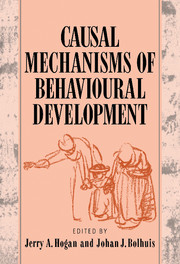Book contents
- Frontmatter
- Contents
- List of contributors
- Foreword: Introducing Jaap Kruijt
- Preface
- Part one Introduction
- Part two Development of perceptual and motor mechanisms
- Part three Development of behaviour systems
- Part four Development of cognition
- Part five Learning and development
- 14 Behavioral change as a result of experience: toward principles of learning and development
- 15 The varieties of learning in development: toward a common framework
- 16 Representation development in associative systems
- Author index
- Subject index
15 - The varieties of learning in development: toward a common framework
Published online by Cambridge University Press: 19 January 2010
- Frontmatter
- Contents
- List of contributors
- Foreword: Introducing Jaap Kruijt
- Preface
- Part one Introduction
- Part two Development of perceptual and motor mechanisms
- Part three Development of behaviour systems
- Part four Development of cognition
- Part five Learning and development
- 14 Behavioral change as a result of experience: toward principles of learning and development
- 15 The varieties of learning in development: toward a common framework
- 16 Representation development in associative systems
- Author index
- Subject index
Summary
During development, factors in the animal combine with its ‘experiences’ to produce a functioning adult. When it comes to analyzing what those experiences are and how they have their effects, one immediately confronts basic questions about learning. Are any or all of the effects of experience in development fundamentally different in some way from ‘learning’? What should we include as learning anyway? Are the effects of discrete, welldefined experiences on adults relevant to understanding the role of experience in development? Can we answer all these questions simply by postulating different kinds of learning?
Historically, learning has been studied from two different perspectives. In psychology, interest in learning stems from the philosophical background of associationism. The enduring appeal of the notion that all behavior and mental life are built up of simple associations is evident in the contemporary interest in connectionist modelling (cf. McLaren, this volume). The biological or more functional approach, in contrast, sees learning as part of the animal's adaptation to its environment, without making assumptions about the form that learning might take. To psychologists, the biological approach seems atheoretical and insufficiently general; to zoologists or developmentalists wanting to understand how particular animals develop in their niches, the psychologists' study of learning in the laboratory seems artificial and irrelevant. Psychologists' attempts to synthesize learning theory and the analysis of phenomena like imprinting that were discovered in a developmental context (e.g. Hoffman & Ratner, 1973) have usually seemed forced and unconvincing.
- Type
- Chapter
- Information
- Causal Mechanisms of Behavioural Development , pp. 358 - 376Publisher: Cambridge University PressPrint publication year: 1994
- 3
- Cited by

